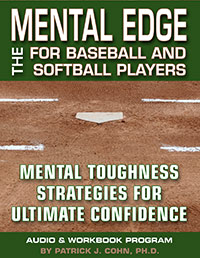Overcoming Nervousness in Games
Excessive nervousness is a baseball or softball player’s enemy…
For some ball players, excessive nervousness occurs prior to and during every game. Not only can excessive nervousness cause you to perform poorly, it can ruin your ball game experience…
There are many symptoms of excessive nervousness. Some of these symptoms are related to the mind, while others manifest themselves in the body.
Physical symptoms of nervousness:
- Upset stomach
- Tight muscles
- Shortness of breath
- Heart pounding
- Fidgeting
- Heavy sweating
- Feeling shaky
Mental symptoms of nervousness:
- Fear of failing: Fear of failure is beset with ‘what ifs.’ What if I strikeout… What if I make an error… What if I fail… What if I let my teammates down… What if a college recruiter sees me perform poorly…
- Trouble maintaining focus: Excessive nervousness causes your mind to oscillate, like a fan, from the past, present and future taking away from your ability to concentrate in the moment.
- Apprehension: Excessive nervousness creates trepidation slowing down your reaction time and causing you to play tentatively.
- Self–doubt: One of the biggest symptoms of excessive nervousness is a plummeting of confidence.Without confidence, you go into baseball games at a deficit.
- Flashbacks: Excessive nervousness sends you back in time to a place where you relive all your practice, scrimmage and game disasters.
- Difficulty staying calm: Excessive nervousness interferes with your ability to stay calm, negatively affecting your ability to think on your feet.
- Nervousness: It can give you a sense of excitement and an edge over your competitors.
Every player feel pregame jitters… The problem is when nervousness snowballs and becomes excessive.
If you examine the progression of nervousness, you would find that your mind is the critical controlling element. When your mind focuses on thoughts about past mistakes and fears about future outcomes, your nervousness increases.
So, if your mind can cause nervousness to spiral out of control, your mind can also work in reverse.
If you can focus on mental cues to help you focus in the present, then you can get those nerves to work for you and give you a mental edge over your competition.
Imagine if you were competing in a win-or-go-home situation… The potential excessive nerves could worsen matters unless you knew how to manage those nerves.
New York Yankee pitcher, Chad Green, was in just that kind of situation…
The Yankees were facing the Minnesota Twins in a one-game wildcard elimination game. The season basically came down to this one game.
Green, a relief pitcher, was summoned to the mound in the middle of the first inning after Yankee starter, Luis Severino, gave up three runs with runners on second and third and only one out.
Green didn’t even have enough time to complete his warm-up routine before standing on the mound in the biggest game of his life.
GREEN: “I kind of got ready pretty quick and the next thing you know, I was in the game… I was just trying to slow the game down and take it one pitch at a time.”
Green didn’t have time to get nervous.
That is, Green had to get to the mound and get to work, pitch by pitch, instead of over-thinking what could happen. Green was immersed in the moment.
That poise on the mound served Green well as he struck out two hitters to end the inning. By Green staying in the moment, he allowed the Yankees to climb back in the game, win the contest 8-4 and advance to the next playoff series.
By learning how to control your nerves before they control you, you’ll be ready to play the game at your peak.
How to Manage Your Nerves
Since awareness is key to anxiety control, identify your top three common nervousness symptoms.
What happens to your body and mind when nervous?
These are your mental alerts that you need to reel it in a little and calm yourself so you can play at your peak.
The earlier you can detect that your anxiety level is increasing, the better chance you have to regulate those nerves.
You can do some breathing exercises or better yet to can rationalize with yourself that it just a game that’s supposed to be fun and not nerve racking.
Related Sports Psychology Articles
- One Baseball Myth About Playing with Nerves
- How to Develop a Ball Player Championship Mindset
- How to Recover in the Middle of a Game
*Subscribe to The Sports Psychology Podcast on iTunes
*Subscribe to The Sports Psychology Podcast on Spotify
Get The Mental Edge for Baseball and Softball
If you have trouble taking your practice game to competition and under perform in games, your mental game might be the culprit! Baseball and softball players contact me everyday wanting to know why they become scared, anxious, afraid to make mistakes, and lack trust in their skills during games…
You might have a ton of physical talent and perform great in practice, but if you can’t get the job done when it counts, something is missing and the problem is an inferior mental game–not talent or motivation.
We’ve spent the last six months developing a program to teach you how to improve your mental game in 8 easy-to-apply lessons–the same TOP lessons that I teach to baseball and softball players everyday in my one-on-one mental coaching program!



Leave a Reply